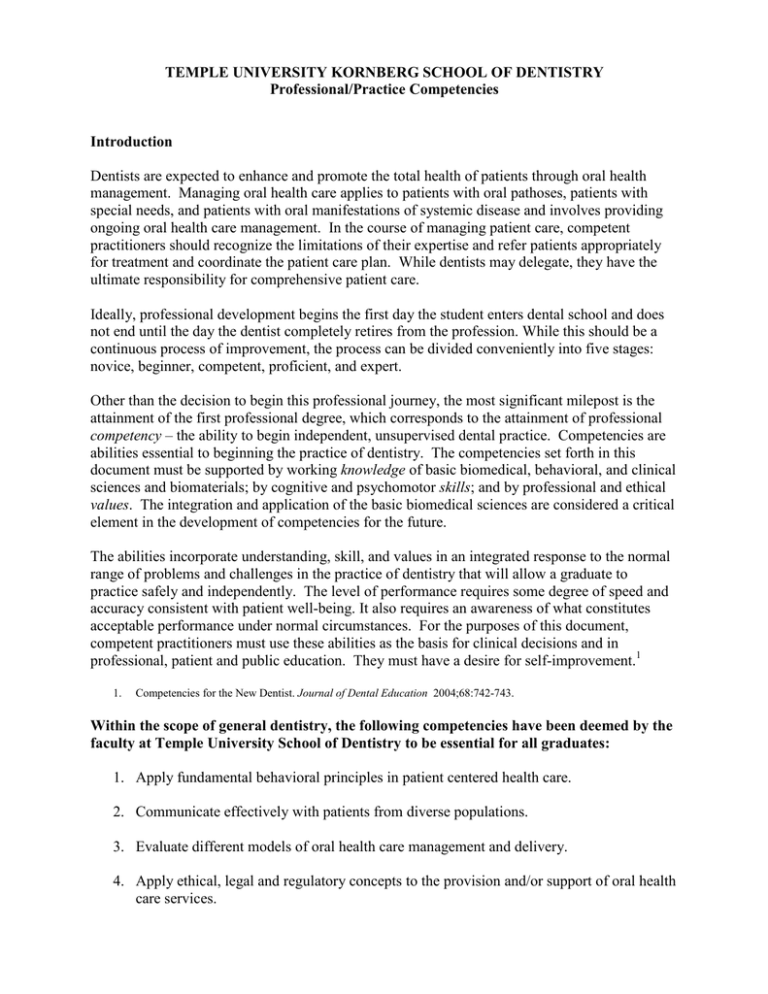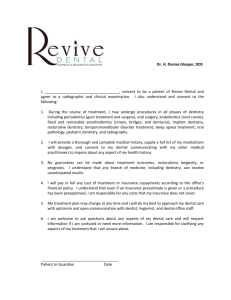Temple University Kornberg School of Dentistry Professional
advertisement

TEMPLE UNIVERSITY KORNBERG SCHOOL OF DENTISTRY Professional/Practice Competencies Introduction Dentists are expected to enhance and promote the total health of patients through oral health management. Managing oral health care applies to patients with oral pathoses, patients with special needs, and patients with oral manifestations of systemic disease and involves providing ongoing oral health care management. In the course of managing patient care, competent practitioners should recognize the limitations of their expertise and refer patients appropriately for treatment and coordinate the patient care plan. While dentists may delegate, they have the ultimate responsibility for comprehensive patient care. Ideally, professional development begins the first day the student enters dental school and does not end until the day the dentist completely retires from the profession. While this should be a continuous process of improvement, the process can be divided conveniently into five stages: novice, beginner, competent, proficient, and expert. Other than the decision to begin this professional journey, the most significant milepost is the attainment of the first professional degree, which corresponds to the attainment of professional competency – the ability to begin independent, unsupervised dental practice. Competencies are abilities essential to beginning the practice of dentistry. The competencies set forth in this document must be supported by working knowledge of basic biomedical, behavioral, and clinical sciences and biomaterials; by cognitive and psychomotor skills; and by professional and ethical values. The integration and application of the basic biomedical sciences are considered a critical element in the development of competencies for the future. The abilities incorporate understanding, skill, and values in an integrated response to the normal range of problems and challenges in the practice of dentistry that will allow a graduate to practice safely and independently. The level of performance requires some degree of speed and accuracy consistent with patient well-being. It also requires an awareness of what constitutes acceptable performance under normal circumstances. For the purposes of this document, competent practitioners must use these abilities as the basis for clinical decisions and in professional, patient and public education. They must have a desire for self-improvement.1 1. Competencies for the New Dentist. Journal of Dental Education 2004;68:742-743. Within the scope of general dentistry, the following competencies have been deemed by the faculty at Temple University School of Dentistry to be essential for all graduates: 1. Apply fundamental behavioral principles in patient centered health care. 2. Communicate effectively with patients from diverse populations. 3. Evaluate different models of oral health care management and delivery. 4. Apply ethical, legal and regulatory concepts to the provision and/or support of oral health care services. Temple University School of Dentistry Clinical Competencies 5. Use critical thinking and problem solving related to the comprehensive care of patients. 6. Obtain and interpret patient data for accurate assessment and diagnosis. 7. Formulate a comprehensive treatment and/or referral plan. 8. Utilize the principles of health promotion and disease prevention. 9. Provide information to facilitate informed consent. 10. Prevent and manage patient pain and anxiety. 11. Restore defective teeth to proper form, function and esthetics. 12. Manage the replacement of teeth for the partially or completely edentulous patient. 13. Prevent and manage periodontal diseases. 14. Prevent and manage pulpal and periradicular diseases. 15. Manage oral mucosal diseases and disorders. 16. Perform uncomplicated oral surgical procedures. 17. Manage medical emergencies. 18. Manage dental emergencies. 19. Manage patients requiring minor tooth movement or space maintenance. 20. Evaluate the outcomes of patient treatment. 21. Prevent and manage oral diseases and disorders for patients with special needs. 22. Utilize universal infection control practices during patient treatment.

